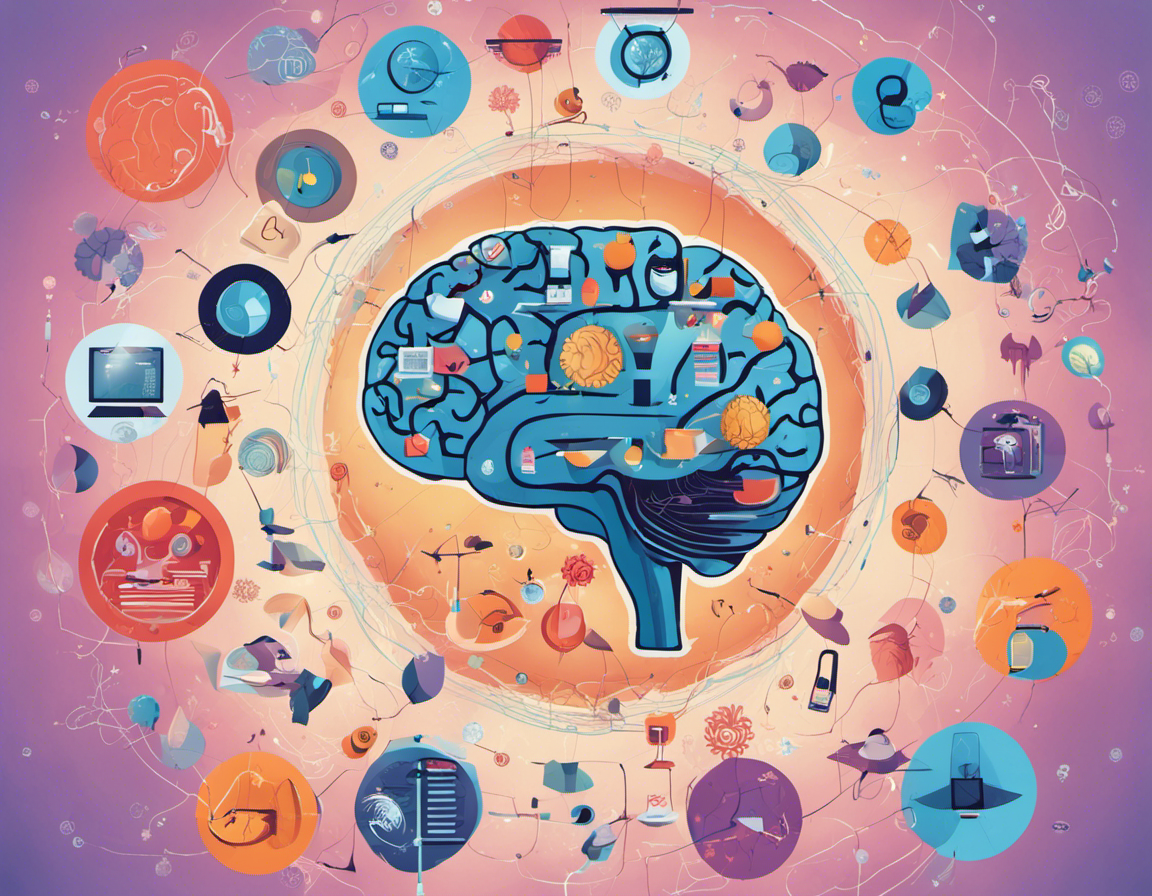Unlocking Brain Power: Enhancing Cognition through Sleep, Diet & Exercise

Have you ever wondered about the full potential of your brain? Imagine harnessing a significant percentage of your cognitive abilities with small yet effective changes in your lifestyle. Welcome to a fascinating journey where we will delve deep into the world of cognitive enhancement, which holds key insights on enhancing focus and mental clarity.
Our lives are becoming increasingly fast-paced. We often find ourselves spread too thin, meeting deadlines, multitasking, and generally feeling overwhelmed. Amidst this chaos, it’s essential to maintain mental clarity at all times. But how?
This comprehensive article draws insights from scientific studies, case studies, and expert opinions to provide a clear understanding of simple yet effective strategies for cognitive enhancement. We will explore the vital role of quality sleep on cognitive functions – shedding light on why “sleeping on it” may not just be an old wives’ tale.
Diet
We’ll explore the intricate relationship between nutrition and our cognitive performance. Your food habits could well hold the key to unlocking higher levels of concentration and focus. Furthermore, we examine how physical activities influence our brain capacities – illustrating how a simple run or walk could remarkably energize your brain.
Looking beyond our daily routines, we also delve into scientific breakthroughs: neuroplasticity. Exploring this field reveals fascinating connections between our brain structure changes and mental capabilities. Balancing out these natural phenomena, we’ll look at the impact of emerging technologies on cognition, critically assessing their benefits and drawbacks.
The article endeavors to provide you with impactful strategies based on numerous successful case studies that can be integrated into your daily life for improved cognitive performance.
Improving cognitive abilities isn’t just about being more intelligent or sharper; it’s about enhancing your quality of life overall – enabling you to navigate daily challenges more effortlessly and make the most out of every opportunity. So buckle up and get ready to unlock your brain power – redefining your cognition through sleep, diet, and exercise.
Welcome to a world where mental clarity is not a momentary occurrence but a lifestyle.
In a world where cognitive prowess often equals success, a fascinating race is underway – the race to enhance our cognitive abilities. Imagine achieving laser-sharp focus, enhanced mental clarity, and exceptional problem-solving skills as easily as flipping a switch. Well, it turns out that our lifestyle choices and emerging technologies might offer us that astonishing potential. In this article, we delve into these intriguing possibilities.
Cognitive Enhancement
In simple terms, cognitive enhancement refers to the improvement of cognitive abilities. It involves methods to augment memory, attention, creativity, intelligence, or other aspects of mind performance.
Cognitive processes are integral to our daily lives. They help us make decisions, solve problems, and absorb new information. Hence, the potential for enhancing these skills has attracted interest from various sections of society, including scholars, health professionals, researchers, and even the general public.
Improved Focus and Mental Clarity
The quest for enhanced cognition often leads us to two critical elements: focus and mental clarity.
Increasing focus means improving one’s ability to pay attention to a task for extended periods. Mental clarity, on the other hand, relates to our minds’ ability to process information efficiently – ultimately improving our understanding and decision-making capabilities.
The Impact of Quality Sleep on Cognitive Functions
One of the simplest yet most effective ways of enhancing cognitive abilities is ensuring quality sleep. The brain uses sleep time for vital tasks, including consolidating newly learned information, removing neural waste products, and restoring physical. Lack of quality sleep can negatively impact these processes, resulting in cognitive deficits.
While we sleep, our brains cycle through different sleep stages, including REM (Rapid Eye Movement) sleep. The REM phase has been linked with learning and memory processing, while deep sleep stages aid in flushing out toxins from the brain that build up during waking hours.
Poor sleep patterns don’t just cause a foggy-headed feeling; they can lead to more severe issues like impaired memory and reduced cognitive function. Long-term sleep deprivation is even linked with neurodegenerative diseases like Alzheimer’s.
Relevant Scientific Studies on Sleep and Mental Abilities
The link between sleep and cognitive abilities has long been established in scientific studies. For instance, a study published in the Journal of Child Psychology and Psychiatry found that children who get fewer hours of sleep are seen to exhibit lower cognitive performance compared to their well-rested peers.
A separate study by Boston’s Brigham and Women’s Hospital noted that people with irregular sleep patterns showed reduced cognitive abilities and accelerated brain aging. Their results proved that maintaining consistent sleep-wake cycles benefits our cognitive health.
Extensive research also alludes to the benefits of quality sleep for different types of cognitive tasks. Whether complex problem-solving tasks or memory recall tests, a good night’s sleep invariably boosts performance.
While these studies focus on the importance of sufficient and quality sleep, they also underscore the damaging effects of disrupted or insufficient sleep on our cognitive functions. Poor sleep hygiene is not just about feeling groggy the next day; it significantly affects our mental prowess in the long run.
The Role of Nutrition in Cognitive Performance
We’ve all heard the term “you are what you eat,” but have you ever considered how nutrition impacts your cognitive performance? Certain nutrients play a pivotal role in the maintenance and growth of brain cells. For instance, Omega-3 fatty acids found in fish are essential for brain health, while antioxidants in fruits and vegetables help combat oxidative stress that can damage neurons. Moreover, a diet balanced in macronutrients promotes sustained energy levels, which is key for mental stamina. One study showed that children who consumed breakfast regularly had better cognitive function related to memory and attention span. In conclusion, adopting an optimally balanced diet is one way to give your brain the fuel it needs to perform at its best.
Role of Physical Activities in Enhancing Cognitive Abilities
Physical activity is not just beneficial for our bodies; it enhances our minds as well. Regular exercise promotes blood flow to the brain, providing a richer supply of oxygen and nutrients for optimum brain functioning. Furthermore, research suggests that physical activities like cycling or running can stimulate neurogenesis – creating new nerve cells. This has been associated with improved memory and learning capabilities. One study even revealed that aerobic exercise could increase the size of crucial brain areas involved in cognitive control and memory formation. So remember, jogging around your block might do more than just burn calories – it could also significantly boost your cognition!
Neuroplasticity and Its Impact on Cognitive Enhancement
Neuroplasticity, often dubbed as the brain’s ability to ‘re-wire’ itself, holds exciting implications for cognitive enhancement. This dynamic process allows our brains to create new neural pathways in response to learning and experience. It implies that our cognitive capacities are not fixed; they can improve throughout our lifetime. We can harness neuroplasticity for cognitive enhancement with targeted training or lifestyle changes. Practices such as mindfulness meditation have been shown to stimulate neuroplastic changes that improve attention control, emotion regulation, and self-awareness. Hence, understanding and utilizing neuroplasticity could be a game-changer for optimizing your cognitive abilities.
Modern Technologies Impact on Cognition: Pros and Cons
Modern technologies usher in a new era of cognitive enhancement. Neurofeedback devices present one example – they enable individuals to visualize their brain activity and gradually learn to control it, leading to enhanced cognition and focus. Similarly, computerized cognitive training programs have demonstrated potential in improving memory and attention span.
However, a cybernetic frontier beckons caution – overuse of technology may have adverse effects like digital distraction and addiction. Maintaining a balanced relationship with technology is crucial in digitally saturated environments to ensure it supports rather than hinders cognitive growth.
Case Studies on Cognitive Enhancement Strategies and Their Effectiveness
Examining case studies of individuals who successfully boosted their cognitive abilities offers invaluable insights into effective strategies. For instance, the renowned ‘memory athletes’ employ an ancient technique called the “method of loci”. They view their minds as palatial memory homes filled with vivid, spatially rooted images to remember information. Such mnemonic strategies capitalize on our evolved brain architecture for spatial memory and vivid imagery—demonstrating the intersection of ancient wisdom and modern cognitive science in enhancing cognition. Another case study features seniors who participated in a specially designed physical exercise program, showing marked improvements in memory performance. These examples reveal that cognitive enhancement is within reach for everyone with the right strategies and determination.
Conclusion
In conclusion, cognitive enhancement is indeed within our reach. Pathways to enhanced cognitive abilities are multi-dimensional, involving factors such as synchronizing our sleep-wake cycles, opting for a nutrient-rich diet, subscribing to a consistent exercise regime, embracing the gifts of neuroplasticity, and judiciously utilizing technology. Empowering findings in the fields of neuroscience and psychology affirm that our cognitive capacities are fluid – not fixed, thereby encouraging us to adopt healthy lifestyles.
Cognitive enhancement is not just about capitalizing on our strengths but also about developing strategies to mitigate weaknesses. Remember the inspiring case studies of memory athletes and seniors staying cognitively agile through physical activity; your cognitive potential awaits discovery and development. Now is the time to take your cognitive performance seriously. Nurture your brain, cultivate focus, honor sleep, and choose the right fuel – always strive to optimize and unlock your brain’s potential!
Persistent efforts and wise lifestyle choices can significantly improve your cognitive abilities. Explore more, learn more, and surpass your expectations.




Comments